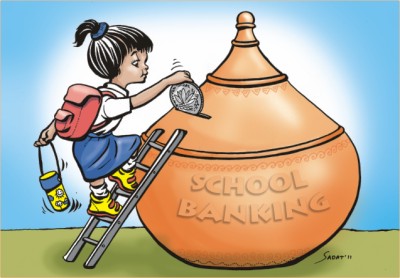A new era of school banking

The school banking programme has recently been launched in Bangladesh. The scheme not only plans to help students and parents with a sizeable amount of savings after a certain period, it also aims to instil the habit of savings from an early age into students.
The scheme will teach kids money management skills that may be useful for the rest of their lives. Through the programme, kids can bank at school, with a hands-on banking experience in a simple way.
In a major decision in November 2010, Bangladesh Bank (BB) asked all banks to open school banking branches. It said students need to be brought under banking services to help them contribute to economic activities through savings.
“So far, the response is very good. Both students and their parents are quite happy with the initiative,” Ali Reza Iftekher, managing director and chief executive officer of Eastern Bank Ltd (EBL), told The Daily Star.
EBL was the first bank that came up with school banking after the central bank issued a circular in this regard. The bank has introduced 'EBL Junior', a savings account for students, aiming to include the young population of society under the umbrella of banking.
The bank has so far opened 500 student accounts. It has set a target to net another 500 by next month, according to Muhammad Musa, head of branches of EBL.
School banking is not new in Bangladesh. Some banks, including Muslim Bank, had introduced a school banking programme in the 1960s, but it did not last long. It was some time before AB Bank (formerly Arab Bangladesh Bank) launched the service in Sunshine Grammar School in Chittagong in 2003. But, that too did not work.
Finally, school banking got renewed impetus when the central bank issued the formal circular in late 2010.
Now, 17 banks have already introduced school banking, according to BB statistics. Another 24 are in the pipeline to open the scheme soon.
Any student, aged between 11 and 17 years, can open an account with banks supporting the service. The account can also be opened at ease with three copies of photo of the account holder and a parent. This is basically a joint account between the student and the guardian.
There are some advantages of opening this account, such as waivers of fees and charges, free internet banking, a waiver of minimum balance requirement, debit card at lower costs, etc.
Banking is not well accepted, particularly among average housewives in Bangladesh. Housewives have long been reluctant to accept banking services because of their poor standing on financial literacy.
But this generation will be different, said Iftekhar. “We believe that when it comes to a child's education, knowing how to manage money is just as essential as English, math, science or arts.”
He said EBL would soon take the service to Chittagong and Sylhet too.
The 'EBL Junior' scheme offers 6 percent interest on a daily balance to be paid semi-annually. This will help the fund in the account grow at a faster rate than conventional savings accounts. A parent can use the account to save for future expenses of the child, like higher education, marriage or any other purpose.
Mutual Trust Bank (MTB) is another bank that has introduced school banking. It launched two products -- MTB Junior and MTB Graduates -- for students.
“Our officials have educating students on banking, products and the financial management,” said Anis A Khan, managing director and chief executive officer of MTB.
SME-focused BRAC Bank has also launched savings products for students below 18 years.
The bank introduced the 'Future Star Account', which is a savings account for minors that offers an opportunity to save for one's child's future. The account is available for children below 18 years of age. However, the legal guardian of the child will operate the account on behalf of the minor.
'Future Star Account' offers an interest rate of up to 8 percent per annum. The interest is accrued on a monthly average balance and applied to the guest account yearly. The minimum account opening balance requirement is Tk 2,000, said a bank official.
Trust Bank has also opened school banking and set up an ATM booth at Rajuk Uttara Model School and College to render services to students. Over 500 accounts have already been opened there, according to Ruhul Amin, an accountant of the college.
“It is very easy to open a student account. Some accounts have even been opened with an initial deposit of Tk 100,000,” said Amin.
Shariah-based banks are also coming up with the service.
Shahjalal Islami Bank has a deposit product named 'Mudaraba Shikhkha (education) Deposit' that can help parents build a base for their children's future education.
Still, many banks are yet to launch school banking. The City Bank and the Prime Bank are two banks working to introduce the programme.
“We are excited and work is underway to launch school banking,” said Masrur Arefin, deputy managing director of The City Bank. But he did not specify the date when the programme would be launched in the market.
Banks do not see school banking as a profit making business. But they are hope that many of these students would become their customers in future.
“We're helping students build a 'savings-attitude'. They might be our future clients,” said Musa of EBL.
[email protected]
News: The Daily Star/ Bangladesh/ May-12-2011




Comments